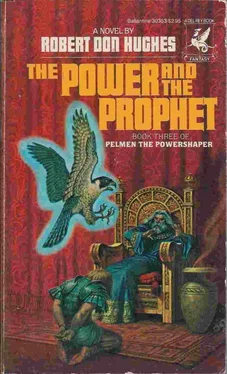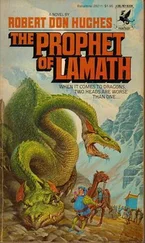“That distinction is lost on me.”
“You could disguise yourself if you so wished and could possibly maintain that fiction for some time. But you couldn’t change your essential character. No shaper chooses his alter-shape. It manifests itself in a moment of magical passion and reflects the shaper’s personality, for good or ill. Flayh is neither as stupid as Vicia-Heinox was, nor—I hope!—as dominatingly powerful.”
Erri unconsciously scratched under his chin, mulling over Pelmen’s words. “Do you think Flayh might have anything to do with these dog packs that keep harassing our borders?”
Pelmen grunted. “Those aren’t dogs,” he muttered.
“They certainly bite like dogs!”
“Have they attacked you?”
“No, but I’ve seen several torn habits and a mauled hand and arm!”
“They’re not dogs. They’re powers who have used Flayh to cloak them in flesh.”
“Demons, then?”
“So some would call them.” Pelmen nodded solemnly. “How many attacks?”
“Too many to number. And all on bluefaithers. I had assumed that the packs were trained by these new Dragonfaithers to go after anyone in a sky blue garment.”
“I fear the dogs and the Dragonfaith are connected. Flayh is clever enough to realize that the best means of threatening Lamath is to make use of its own superstition. His imitation of Vicia-Heinox has renewed serpent worship. These dog attacks on skyfaithers seem to be aimed at convincing Lamathians it’s foolish to trust anything but the dragon.” Pelmen shook his head. “Flayh’s not changed. His purpose is still to control the three lands. It’s just that this time he has the power to accomplish it.”
“No!” Erri snapped, stamping his foot. “By faith we shall resist him!”
“Indeed we will,” Pelmen agreed. “And we’ll make use of some other tools as well.”
Erri looked at him sharply. “What tools?”
“We’re not helpless.”
“Certainly not,” the small prophet grunted. “We have the Power. You’re not thinking of using some other means, are you? More magic, perhaps?”
“Well of course I—”
“Don’t,” Erri ordered. “It would cost you your life.”
Pelmen peered at him. “You know that?”
“I do,” the prophet answered with a curt nod. “Now then, if we know these things are related—the dragon’s reappearance, the strange desert dogs, possibly Serphimera’s disappearance—”
“There’s no proof of that,” Pelmen quickly interrupted. “Serphimera often disappears on business of her own.”
“And it almost always has been related to the dragon.”
“But she’s changed her views! We’ve talked about this at length!”
“The nation of Lamath had changed its view!” Erri argued. “Or so I had thought. Now it appears I was wrong. Perhaps I wanted too much to believe so?” he asked shrewdly, gazing at Pelmen evenly to force home his point. The powershaper turned his head away, refusing to take it. Erri sighed. “We’ll leave that.
I was going to ask if you think all this is related to my other problem.”
“Which is?”
“The Lamathian royal family. The old king is dead. His heir has decided he wants more power.”
“I thought the son was a recluse like his father.”
“He is. But he’s apparently an ambitious recluse.”
“Armies forming?”
“Not yet, I think. Just insistent letters from the vizier explaining the young man’s views. You think Flayh’s behind that as well?”
“He wouldn’t discourage it. But ambition is usually born inside a man, not outside. Is the son capable of ruling?”
“I’ve never seen the boy. I don’t know if he’s capable of anything. I do know his advisors are urging him to embrace the Dragonfaith. So it appears the problems are all of one piece and are all related to this sorcerer in Ngandib-Mar.”
Pelmen nodded. The implications made him weary. “What do you plan?”
“Plan? Why, the same plan I’ve held to since you thrust this task upon me. The lies must be exposed, the truths explained, and the battle won in the hearts of men.”
“More missionaries?”
“More missionaries—sent to the heart of the Mar.”
The heart of the Mar was the city of Ngandib. It stood in the geographical center of the country and, from its commanding height, dominated the surrounding highlands. It sat on a lofty plateau that was often ringed with clouds, so at times the High City seemed to float above the earth, a heavenly city detached from earthly cares.
That illusion passed swiftly for any visitor unfortunate enough to labor from the valley floor to the top of the Down Road. At one time Ngandib’s streets had been tidy and well cobbled. Now they were more mud than cobblestone, and garbage often obscured the roadway entirely. Its people had once been the proudest of a proud race. Now they hung their heads and kept mostly to themselves, for the city was owned by brigands, one of whom had inexplicably been made the head of the city’s defense force. Soon others joined him to celebrate his good fortune—and to steal for themselves what fortunes they could.
Men who had once been hunted as outlaws by the Shurls of the North and South Firs now swaggered arrogantly about, picking fights with the locals and invariably winning. As many as eight or nine bodies a morning were ritually cast off the northern face of the plateau into the Burial Valley.
The problem daily grew worse, yet the king did nothing to stop the carnage nor to punish these loathsome intruders. The people of the city were hardly surprised. They knew their king well. Pahd mod Pahd-el spent most of every day in bed, resting up in preparation for a good night’s sleep. “When Pahd wakes” had become a euphemism for the end of time. Privately, many citizens worried that King Pahd no longer had the power to do anything and that he’d fallen prey completely to the evil manipulations of the mysterious Flayh. They said nothing about it, however. Those foolish enough to criticize Flayh publicly had all disappeared, and there were reports of horrible screams from the vicinity of the High Fortress.
The High Fortress of Ngandib dominated the city as the city dominated the Mar. Built upon a towering spur of granite that rose many hundreds of feet above the plateau, it was obviously impregnable. There was no such citadel anywhere else in the world. It had never been stormed. in. war. In fact, no one had ever been fool enough to try.
The Mans who dwelt in the city had always been conscious of the castle’s lofty mystery. Since Flayh had come, however, men swore that the fortress had assumed a distinctly malevolent personality. It was as if the castle lived and regarded mankind with a permanent snarl of contempt. Those who had once relaxed in the safety of the great tower’s shadow now sought dwellings toward the plateau’s edge. They preferred the precipitous drop-off to the feeling of living constantly under the gaze of a brooding, evil presence. Some had even tried to leave the High Plateau to seek a new life in the Mar proper, but they had been arrested at the top of the Down Road and marched back through the city to the fortress. None of them had been seen since.
Despite the ominous cutoff of downward traffic, men continued to make the harrowing climb up the steep road from the valley. Most of these were themselves cutthroats, coming to join their fellows.
Among them was a small, feisty outlaw named Tibb. He carried with him a small bundle of personal possessions, a much-used sword, and a concealed dagger. Tibb had not come seeking fortune, fellowship, or a merry time at the expense of the townfolk of Ngandib. Tibb had come for revenge.
When he reached the top of the Down Road, he was challenged by a cluster of ugly thugs. “Stand, rascal, and give us your name!”
Читать дальше












